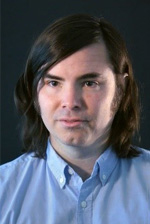
Professor of Software Engineering, Centre for Quantum Software and Information, University of Technology Sydney
At UTS , Michael leads a team researching theoretical aspects of quantum computation, specialising in the capabilities of quantum software and the design of quantum computers. Michael is particularly known for his work in near-term quantum computing devices and focuses his research program on identifying applications that use the power of quantum computers in the easiest, and cheapest, way possible. This involves theoretically identifying applications and experimental benchmarks, designing architectures capable of achieving them, and working with experimental teams to bring them to reality.
Video transcript
Michael Bremner
Professor of Software Engineering,
Centre for Quantum Software and Information,
University of Technology Sydney
I work at the University of Technology Sydney in the Centre for Quantum Software and Information. I’m a Professor of Software Engineering. I study mathematics and theoretical physics and those things intersect with computer science. Google, Microsoft, IBM are developing quantum computing devices, and my job is to develop the applications and the software for those devices. The first idea of possibly building a quantum computer emerged in the early 80s and when I was in high school in the early 90s, just a few really key thinkers were thinking about this. So obviously it wasn’t in the high school curriculum, but what was really important was learning how to learn and learning how to continually evolve my skills. There’s a few key teachers that I had which I would really credit with getting me to where I am today. They encouraged me to be creative, but they also taught me to be disciplined in my work — to channel that creativity.
Certainly, throughout my career I’ve seen that the people who are good at that, the people who can find a way of working with the information that they have and the capacity to synthesise, are the ones who succeed. The sort of skills that I think are going to be really essential for students going forward is taking a step back from, you know, the user interface which you are used to using, you know, you’re used to using Facebook, you’re used to using Google, used to using Gmail, those sort of things. Try and take an understanding of what’s behind those things and how they work, is actually really important. The future of technology, it’s hard to predict. We don’t know where things are going to be so what we need is the skills so we can adapt.
People have said it a million times over but literacy and numeracy matter. The ability to communicate matters. Communication skills are really important in most occupations and I’d say in science, in particular, you need to communicate very complex ideas to people and find ways of doing that which people understand, even fellow scientists working in your field. I’ve worked in big collaborative networks working towards common goals and that involves obviously a lot of coordination and a lot of team work. And in order to get that to work, leadership is something I’ve learnt is very important. Coordinating everybody to work towards a common goal is really vital.
My one wish for young people is that they are happy and comfortable with themselves, and that as they grow older, they embrace who they are and they let that take them where they need… where they need to go.


